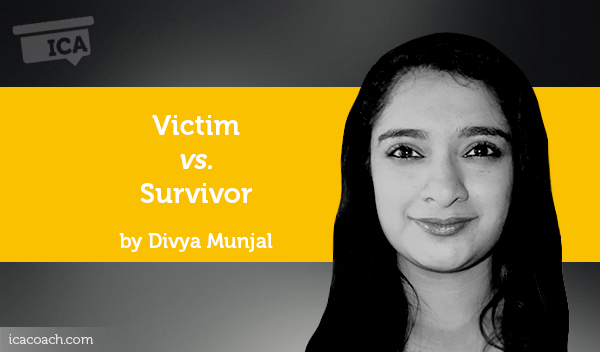
A Coaching Power Tool Created by Divya Munjal
(Spiritual Coach, INDIA)
This power tool is for anyone looking out to come out of the victim mentality and turn into a survivor.
One of the definitions of “Victim” in the oxford dictionary is — “A person who has come to feel helpless and passive in the face of misfortune or ill-treatment”. In the context of this power tool, I take this definition of a victim and touch upon the victim mentality.
Victims feel weak. They feel helpless and overpowered by their external circumstances. Often self-pity is involved. They lean toward blaming the world, destiny, God and people around them for their situation and problems. Victim mentality convinces people that their life is dictated by external forces and that there is nothing they can do to change it. This is a self-defeating attitude. They give away their power. Now, is it wrong to think of oneself as a victim? A person who feels like a victim has a reason to back this feeling. The reasons can range from the death of a loved one, a health issue, an accident, divorce, being a crime victim, unfair loss of a job or opportunity. Is this person who has undergone a major incident in life supposed to feel like a survivor from day one? NO, absolutely not. These are incidents beyond the individuals control. Life knocks one down and there is nothing that can be done. This is when the mentality — victim or survivor — comes to the picture. The situation may not change depending on its severity, like death cannot be undone. If it is a situation where a person makes themselves believe that nothing can change, when in fact it can, then they are underestimating their power to change things. Despite the situation, the mentality can be changed from victim to survivor. It is important to know what your situation is like. No two situations are the same. Yet the principles applied to emerge as a survivor can be the same.
Self-Application:
It is important to recognise when you are feeling like a victim. This power tool is designed to identify that. The enemy needs to come out of hiding. Otherwise, you look everywhere, yet don’t know what the underlying issue is. Calling oneself the victim is tempting, it happens to the best of people. It is easy. It allows a person to shift blame and gives an excuse not to take charge of their lives. This state becomes their comfort zone. This comfort is questionable. I repeat. Is it really comfort or faked comfort? A victim is never happy. A victim is not satisfied. Deep down this person is yearning to feel powerful and live the life they want to and they can. It is possible. There is hope. Hope of change. You can become a survivor. Victim mentality is a precursor to survivor mentality. If there is no victim, there is no survivor. A survivor is a victim that endured and succeeded.
Becoming a survivor is a gradual process. Everyone goes through stages of powerlessness. It is fine. But give yourself the fortune to believe that this can change. You can see a new day through different glasses. You live the tale of a survivor. Identify if you have this victim mentality. Are you in a situation where you think you are the victim? Challenge it. Think of alternatives. What was your role in this situation? Take responsibilities for your mistakes if the situation is a make believe victim state. Even the most unfortunate of events have a purpose in your life. Discover this purpose. You might end up being surprised by what you find. You might uncover the blessings coming from this unfortunate event.
Some victims are hard on themselves. They think they deserved what they got. Ask yourself if you think this way.
Coaching Application:
A coach can be instrumental in identifying if the client has a victim mentality. Each client is in a different stage of transition. Each client works at their own pace and in a manner which is suitable to them.
A couple of questions for such a situation are:
Famous examples:
History is replete which examples of people who overcame vast odds and excelled. These were people who were faced with immense disability. They faced them head on and are survivors who took charge.
Optimism is the faith that leads to achievement. Nothing can be done without hope and confidence. – Helen Keller
Reflections:
- Look around you, identify people who survived the odds?
- Again look around you, identify people who continue thinking they are a victim?
- What is the difference between these two groups of people?
- Which group do you want to belong to?
- List your strengths and use them to your advantage.
References:
http://www.oxforddictionaries.com/definition/english/victim
http://www.brainyquote.com/quotes/authors/s/stephen_hawking.html